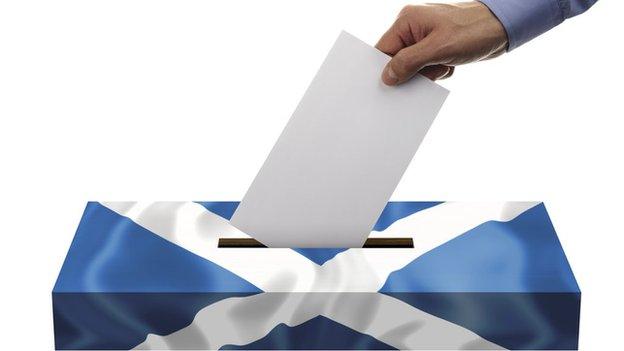Scottish independence: Post-referendum agreement reached
- Published

The referendum will be held on 18 September, with voters asked the Yes/No question: "Should Scotland be an independent country?"
The UK and Scottish governments have finally agreed a form of words to explain what will happen after the independence referendum.
Their explanation of the processes that will be followed in the event of either a "Yes" or a "No" vote will be included in an Electoral Commission information leaflet.
The commission had asked the two governments to come up with a joint statement by last Christmas.
But negotiations took much longer.
The agreed statement stressed that the result of the referendum will be decided by whichever side receives the most votes.
It said: "If more people vote 'Yes' than vote 'No' in the referendum, Scotland would become an independent country.
"If more people vote 'No' than 'Yes' in the referendum, Scotland would remain a part of the United Kingdom."
It also emphasised that, in the event of a "Yes" vote, independence will not happen until negotiations between "people representing Scotland and people representing the rest of the United Kingdom" have been completed.
These negotiations would include "discussion about the allocation of assets and liabilities", it added.
In the meantime, Scotland would continue to be part of the UK, with the existing division of powers between Holyrood and Westminster continuing.
After independence, the Scottish government would "become responsible for all aspects of government in Scotland," it stated.
In the event of a "No" vote, the statement said that the UK Parliament and government would continue to be responsible for reserved matters such as defence, security, pensions, benefits and most tax powers while Holyrood would retain control of devolved matters.
The agreement commits the two governments to working together to implement the added powers agreed in the Scotland Act 2012, specifying the enhanced tax powers.
The statement does not mention the Scottish government's proposed date of 24 March 2016 as Scotland's independence day.
It also makes no mention of the offer of more powers from the three main pro-Union parties.
Instead, it states that any further changes to Holyrood powers would "be made by the UK Parliament, seeking the consent of the Scottish Parliament."
The statement will be included in an Electoral Commission pamphlet which will be distributed to homes across Scotland prior to the referendum on 18 September.
The document will also include messages to voters from both the pro-independence Yes Scotland campaign, and Better Together, which supports Scotland remaining part of the UK.